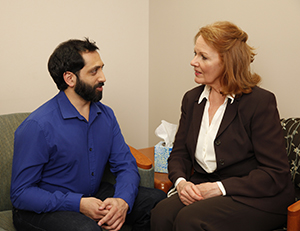Understanding Schizophrenia
Understanding Schizophrenia
Schizophrenia is a severe and puzzling brain disorder. It dramatically changes the way a person thinks, acts, and feels. It can disrupt each life it touches. And it can cause great emotional pain. If a loved one has schizophrenia, don’t lose hope. Right now, there is no cure. But treatment may help ease symptoms. Also, there are many support services for people with schizophrenia and their families.
What are the symptoms?
The symptoms of schizophrenia can vary greatly. People with the disorder may see or hear things that aren’t there. Or they may firmly believe something that isn’t true. At times they may be quiet, listless, and withdrawn. They may have little eye contact, and may not seem to respond. At other times, they might talk or act in strange ways.
Who does it affect?
Schizophrenia affects both men and women. It can strike people of all races, cultures, and incomes. Sadly, it often begins in early adulthood. It may occur when young people are still in school. They may not have learned certain life skills. And they might not have a chance to build careers or lasting relationships.
What causes it?
The causes of schizophrenia aren’t fully known. It’s likely that many factors are involved. For example, schizophrenia seems to run in families. The disorder may be triggered by traumatic events. Certain brain chemicals also play a role. And brain structure is different in people with schizophrenia.
How to find help
The first signs of schizophrenia can be shocking. You may find it hard to cope. This is normal. You don’t have to face this problem alone. Check with your local hospital or mental health clinic. Learning more about schizophrenia and going to family support groups can offer you guidance and support.
Hope for the future
Schizophrenia often presents lifelong challenges. But new treatments and the support of others can offer hope.
Updated:
February 21, 2018
Sources:
Schizophrenia in adults: Clinical manifestations, course, assessment, and diagnosis. UpToDate., Schizophrenia Spectrum and Other Psychotic Disorders. American Psychiatric Association. Diagnostic and Statistical Manual of Mental Disorders. 2013; 5th ed.
Reviewed By:
Ballas, Paul, DO,Fraser, Marianne, MSN, RN,Image Reviewed by Staywell medical art team.
